So, you’re diving into the realm of online business. Ready to showcase your fantastic products to the world? Now, the big question: where to sell them?
In the grand showdown of ClickFunnels vs Shopify, two heavyweights are fighting for your attention. Which one suits your business best?
If you’ve been on the online store startup quest, chances are you’ve stumbled upon the Shopify vs ClickFunnels debate.
Amidst the sea of dropshipping and e-commerce guides, the decision can be dizzying.
Fear not! In this guide, we’ll untangle the web and help you pinpoint the ideal e-commerce platform for your unique business.
Here’s the deal: neither tool is flawless on its own. Each has its strengths and quirks.
Your choice boils down to the nature of your business and the products you’re unleashing into the digital wild. Let’s break it down for you.
Overview of ClickFunnels vs Shopify
| Primary Focus | Sales Funnels, Marketing Optimization | Comprehensive E-Commerce Experience |
| Pricing Options | Two Plans (Standard, Platinum) | Three Plans (Basic, Shopify, Advanced) |
| Mobile App | No Dedicated Mobile App | Feature-Rich Mobile App for Management |
| Customization | Limited Template Customization | Extensive Theme Customization Options |
| Inventory Management | Basic | Robust, Suitable for Large Product Catalog |
| Third-Party Integrations | Limited | Extensive App Marketplace |
| SEO Capabilities | Basic SEO Functionality | Robust SEO Features for Optimization |
| Ideal For | Beginners, Focused Marketing Efforts | Businesses with Diverse Product Offerings |
ClickFunnels at a Glance
Originally designed for building sales funnels, ClickFunnels is an all-in-one solution for managing marketing and sales processes.
It offers a range of tools for creating landing pages, webinars, and membership sites, all focused on maximizing conversions.
Shopify Unveiled
Shopify is a complete e-commerce platform that allows entrepreneurs to set up, manage, and scale online stores.
With features encompassing everything from inventory management to payment processing, Shopify is tailored for a comprehensive online retail experience.
Main Differences Between ClickFunnels vs Shopify
- Plan Options:
- ClickFunnels has two plans, including a pricier basic option, while Shopify offers three plan choices.
- Mobile App Presence:
- ClickFunnels lacks a mobile app, whereas Shopify boasts a user-friendly app available on both Android and iPhone platforms.
- Feature Emphasis:
- ClickFunnels shines with features like ready-made sales funnels, focusing on marketing optimization, while Shopify excels in inventory and customer management within a broader e-commerce context.
ClickFunnels vs Shopify: Features Comparison
The core of deciding between ClickFunnels vs Shopify lies in understanding their feature sets.
While both platforms aim to boost online sales, they approach this goal differently, catering to distinct aspects of the digital sales process.
Sales Funnels
ClickFunnels is designed primarily for creating and optimizing sales funnels. It excels in guiding potential customers through a series of steps leading to a conversion, such as purchasing a product or signing up for a service.
The platform offers a plethora of pre-built funnel templates that are easily customizable, and suited for various marketing strategies like webinar funnels, squeeze page funnels, and product launch funnels.
ClickFunnels emphasizes lead capture, nurturing, and conversion, making it a powerful tool for targeted marketing campaigns.
Shopify, on the other hand, does not inherently focus on sales funnels in the traditional sense. However, it allows for the creation of a seamless shopping experience from product discovery to checkout.
Through its extensive app marketplace, Shopify store owners can integrate third-party tools to create funnel-like experiences, such as cart abandonment emails, upsells after purchase, and customer retargeting.
While not as funnel-focused as ClickFunnels, Shopify’s strength lies in creating a comprehensive online store where sales funnels are part of a larger ecosystem.
Some of the best Shopify page builders include Shogun or PageFly can further enhance Shopify’s flexibility, offering users intuitive tools for crafting engaging and conversion-driven pages within the broader e-commerce framework.
ClickFunnels vs Shopify: Which one has a better online store builder?
The Shopify platform excels as an online store builder. First of all, it offers a wide range of customizable templates and themes.
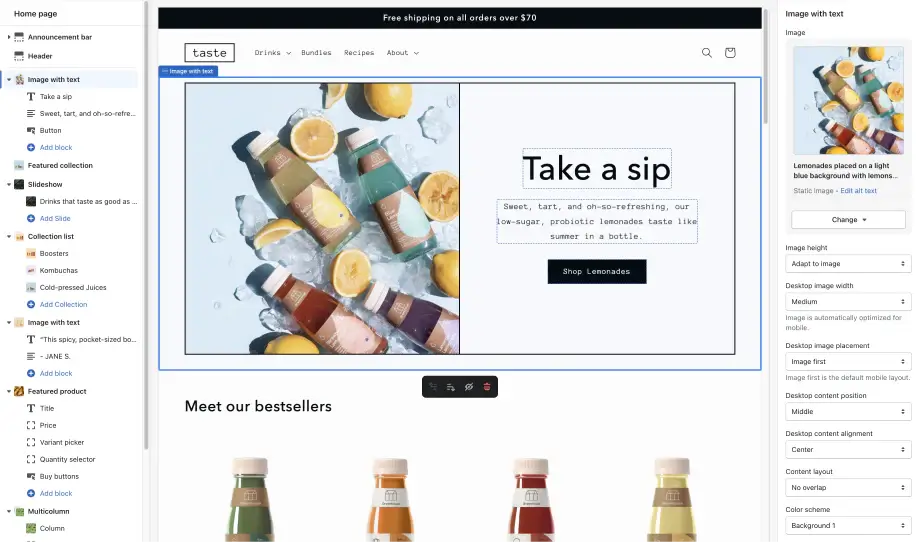
This allows businesses to easily create professional-looking, branded online stores. Additionally, Shopify’s drag-and-drop interface simplifies the design of web pages.
You can effortlessly add products and manage content without requiring deep technical knowledge.
Moreover, the platform is well-known for its scalability. It smoothly supports businesses as they grow from small startups to large enterprises.
ClickFunnels, although capable of handling product sales, stands out for a different purpose. Unlike Shopify, it’s not primarily designed as an online store builder.
Instead, ClickFunnels focuses on creating individual sales pages within funnels, aiming for high conversion rates, and includes features like upsells and cross-sells.
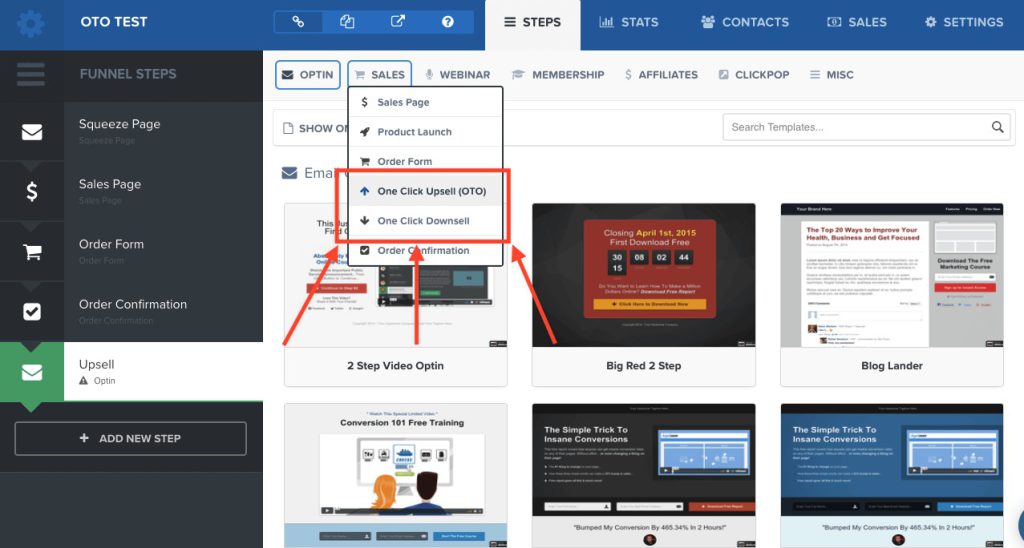
While you can sell products using ClickFunnels, there’s a catch. It lacks the extensive e-commerce features and customization options for your storefront that you’d find in Shopify.
So, it’s more suitable for businesses with a limited product or service range.
ClickFunnels is geared towards maximizing the efficiency of each sale rather than creating a comprehensive online store.
Inventory Management System
With Shopify, inventory management is a breeze. The platform allows for comprehensive tracking of stock levels, automated reordering points, and integration with multiple sales channels like online, retail, and social media.
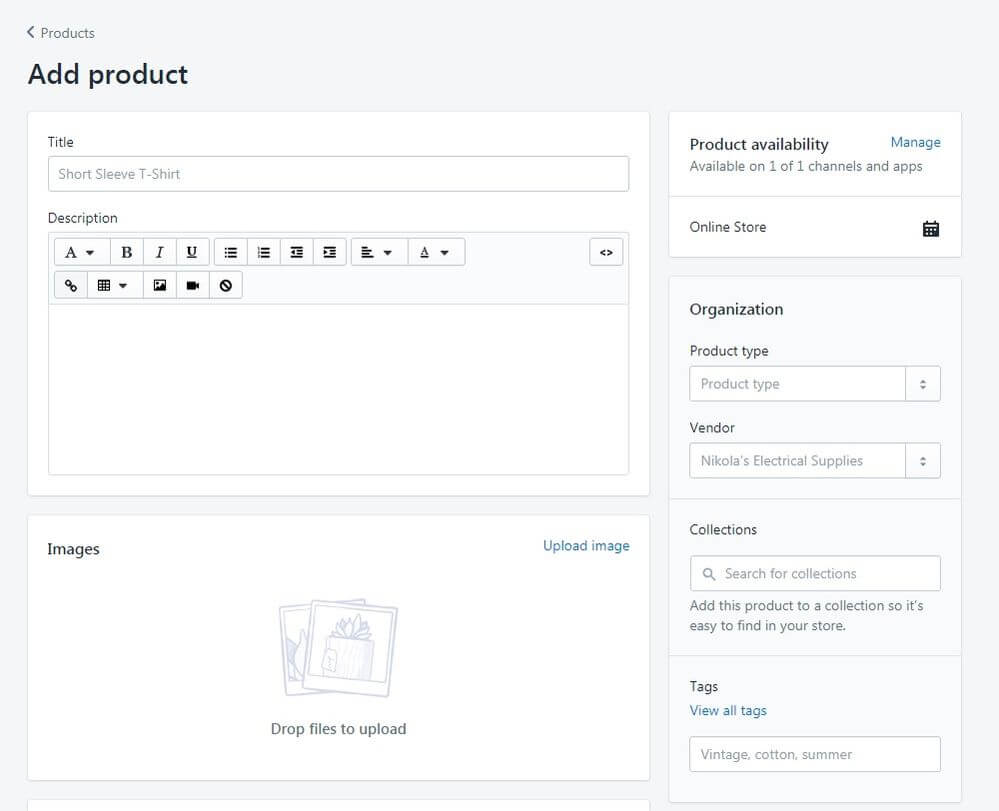
Shopify’s inventory management is robust and scalable, fitting the needs of businesses with extensive product lines and complex inventory requirements.
ClickFunnels does not have a built-in inventory management system as Shopify does.
It is better suited for businesses that don’t require extensive inventory tracking or sell digital products, services, or courses.
CRM System
Shopify offers basic CRM functionalities, allowing store owners to track customer interactions and purchase history. However, for advanced CRM capabilities, Shopify users often rely on integrations with specialized third-party CRM software.
ClickFunnels integrates CRM features within its sales funnels. It effectively tracks customer interactions throughout the funnel stages, providing insights into customer behavior and facilitating targeted marketing efforts.
Email Marketing:
Shopify: Nurturing Customer Connections
- Integrated Email Marketing Apps:
- Shopify integrates with various email marketing apps, allowing seamless connection to popular platforms like Mailchimp, Klaviyo, or Constant Contact.
- Abandoned Cart Recovery:
- Recover potentially lost sales with built-in features for automated abandoned cart recovery emails.
- Customer Segmentation:
- Tailor your email campaigns with customer segmentation based on purchase history, location, and other parameters.
- Discount Code Incentives:
- Easily create and distribute discount codes through email campaigns, enticing customers to make purchases.
- Analytics and Reporting:
- Access detailed analytics on email campaign performance, including open rates, click-through rates, and revenue generated.
ClickFunnels: Streamlining Email Strategies
- Built-in Email Automation:
- ClickFunnels offers built-in email automation, allowing you to set up email sequences for nurturing leads and guiding them through your sales funnel.
- Action-Based Email Triggers:
- Trigger emails based on specific actions, such as clicks, page visits, or form submissions, enhancing personalization.
- Integration with Email Providers:
- While not as expansive as Shopify, ClickFunnels integrates with popular email marketing services like AWeber and GetResponse.
- Follow-Up Sequences:
- Create follow-up sequences to engage with leads and customers at different stages of the funnel, enhancing customer retention.
- A/B Testing for Emails:
- Optimize your email campaigns with A/B testing features, allowing you to experiment with different subject lines, content, and strategies.
You Might Also Like:
Affiliate Program:
Shopify: Expanding Reach Through Affiliates
- Third-Party Affiliate Apps:
- Shopify integrates with third-party affiliate marketing apps, such as Refersion or LeadDyno, to help you set up and manage affiliate programs.
- Customizable Commission Structures:
- Define and customize commission structures for affiliates based on sales, clicks, or other performance metrics.
- Affiliate Dashboard:
- Affiliates get access to a dedicated dashboard to track their performance, sales, and commissions in real-time.
- Discount Codes for Affiliates:
- Provide affiliates with unique discount codes, incentivizing their audience to make purchases while tracking their performance.
- Performance Analytics:
- Access detailed analytics on your affiliate program’s performance, enabling you to optimize strategies and reward top-performing affiliates.
ClickFunnels: Empowering Affiliates in Funnels
- Integrated Affiliate Management:
- ClickFunnels has built-in affiliate management tools, allowing you to create and manage your affiliate program without relying on external apps.
- Easy Affiliate Link Generation:
- Affiliates can easily generate unique tracking links for their promotions, simplifying the process and ensuring accurate commission attribution.
- Real-time Commission Tracking:
- Affiliates can track their commissions in real-time through a dedicated dashboard, fostering transparency and trust.
- Affiliate Training Areas:
- Provide resources and training materials for affiliates within ClickFunnels, helping them effectively promote your products or services.
- Integrated Funnel Analytics:
- Gain insights into how affiliates contribute to your funnel’s success with integrated analytics, understanding their impact on conversions and revenue.
Analytics
Shopify provides comprehensive analytics and reporting features, giving store owners detailed insights into sales trends, customer behavior, and website performance.
This data is crucial for informed decision-making and strategic planning.
ClickFunnels also offers analytics, but with a focus on funnel performance. It tracks metrics like conversion rates, funnel step performance, and A/B testing results, crucial for optimizing marketing strategies.
Integrations
Both Shopify and ClickFunnels offer extensive integration capabilities.
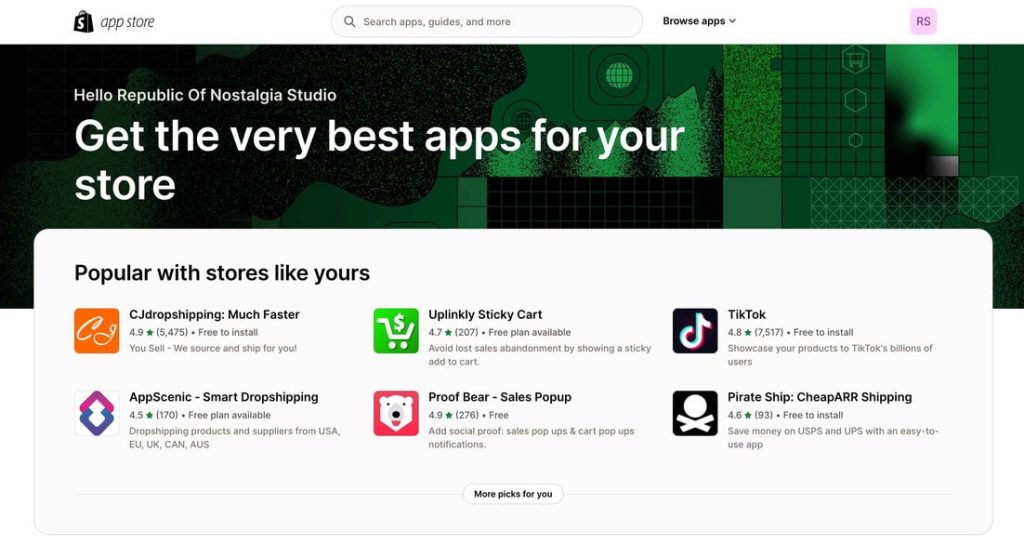
Shopify’s app marketplace includes a vast array of plugins for marketing, SEO, social media integration, accounting, and more.
ClickFunnels integrates with numerous marketing tools, email campaign services, payment processors, and webinar platforms, enhancing its funnel-building capabilities.
Payment Gateways
Shopify shines with its support for various payment gateways, offering a broad spectrum of choices for both sellers and buyers. The platform’s in-house solution, Shopify Payments, makes transactions hassle-free, ensuring a smooth and efficient checkout experience.
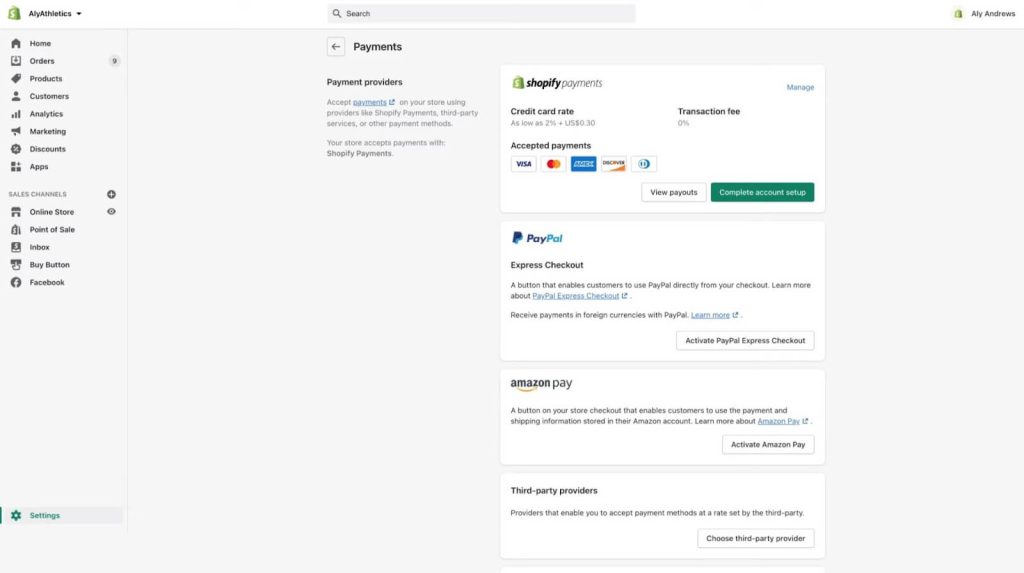
Moreover, by seamlessly linking up with popular services like PayPal and Stripe, Shopify enhances flexibility, meeting the diverse payment preferences of its global user base. This wide array of gateways not only adds convenience but also contributes to creating a user-friendly and dependable online shopping environment.
Similarly, ClickFunnels excels in ensuring seamless transactions within sales funnels. The platform effortlessly integrates with major payment gateways, such as Stripe and PayPal, making the sales process a breeze for users.
This integration plays a crucial role in boosting conversion rates, as businesses leverage trusted and secure payment options to elevate overall customer satisfaction.
SEO
Shopify SEO Features:
SEO capabilities are robust in Shopify, with features for editing meta tags, adding alt texts to images, and creating search engine friendly URLs.
- Comprehensive Meta Tag Control:
- Fine-tune meta tags for titles and descriptions with detailed control.
- Image Alt Text Mastery:
- Seamlessly add alt text to images, enhancing accessibility and SEO.
- Flexible URL Composition:
- Craft clean and keyword-rich URLs for optimal search engine visibility.
- Automatic XML Sitemaps:
- Shopify generates XML sitemaps automatically, aiding search engine indexing.
- Responsive Design Alignment:
- Themes are designed to be responsive, meeting SEO preferences across devices.
ClickFunnels SEO Features:
ClickFunnels, while not primarily focused on SEO, offers basic SEO functionalities for funnel pages.
- Fundamental Funnel Page SEO:
- Offers basic SEO functionalities for optimizing sales funnel pages.
- Limited Alt Text Options:
- Provides alt text options for images, though not as extensive as some platforms.
- Partial URL Customization:
- Allows a certain level of URL customization, catering to funnel structures.
- SEO Harmony with Funnel Structure:
- Aligns SEO features with the unique needs of sales funnel pages.
- Focused SEO Support:
- While not a comprehensive SEO platform, it provides focused support for funnel-based marketing strategies.
Customer Support
Both platforms provide strong customer support, with Shopify offering 24/7 support via chat, email, and phone, along with a comprehensive knowledge base.
ClickFunnels also provides excellent support resources, including a vibrant community, a detailed knowledge base, and a dedicated support team
Customization and Flexibility in Design
Customization and flexibility in design are key strengths of both ClickFunnels and Shopify, catering to distinct aspects of online business:
ClickFunnels Customization:
- Drag-and-drop editor for easy sales page creation.
- Embedding of images, videos, pop-ups for enhanced user engagement.
- Pre-designed templates customizable for brand alignment.
- Advanced customization options for lead capture forms.
- Integration capabilities with email marketing tools to complement funnel design.
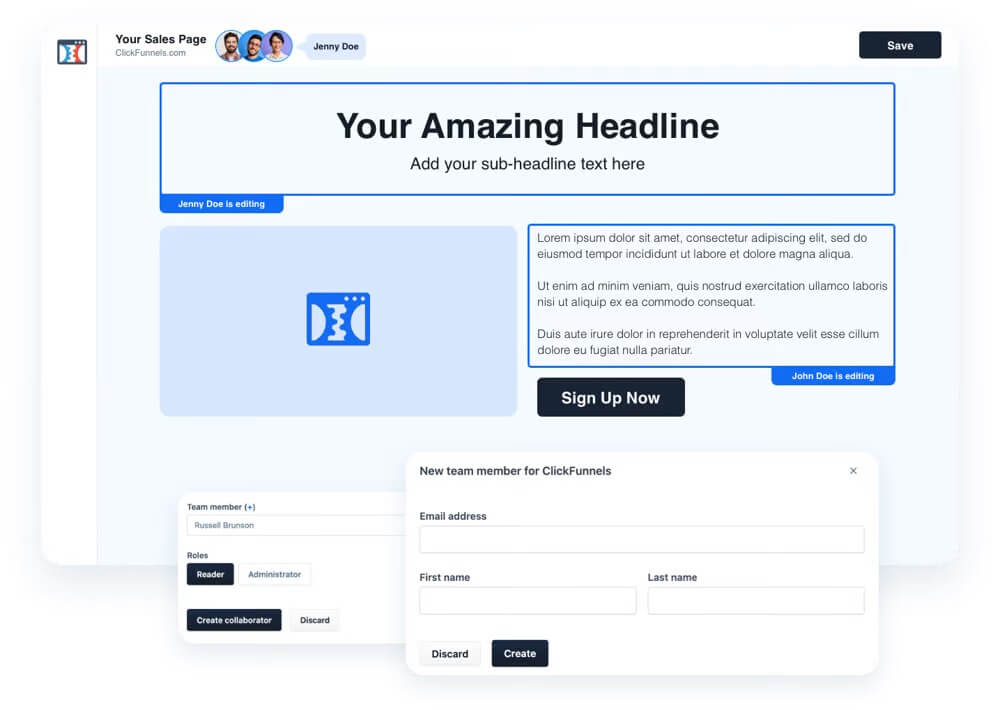
Shopify’s Design Flexibility:
- Wide selection of customizable themes for online stores.
- User-friendly interface for non-technical users.
- Scalable design to accommodate business growth.
- Extensive app marketplace for adding specialized functionalities.
- SEO-friendly design features to enhance online visibility.

Both platforms enable users to create unique, brand-aligned online presences, with ClickFunnels focusing on targeted marketing pages and Shopify on comprehensive e-commerce storefronts.
Scalability and Growth Potential
Understanding how each platform caters to business growth and scalability is crucial for long-term planning.
Shopify’s Scalability: Shopify is renowned for its scalability, effectively supporting businesses as they expand.
From small startups to enterprise-level operations, Shopify’s infrastructure can handle increased traffic, sales volume, and more complex operational needs.
This scalability ensures that businesses do not need to migrate to another platform as they grow, making Shopify a reliable choice for long-term e-commerce growth.
ClickFunnels for Growing Businesses: While ClickFunnels is primarily a funnel-building tool, it also offers scalability in terms of marketing.
As a business’s marketing needs evolve, ClickFunnels can accommodate more complex funnels and integrate with a growing number of marketing tools and services.
This makes it a viable option for businesses that are scaling their online marketing efforts, even if their e-commerce needs are met elsewhere
ClickFunnels vs Shopify Pricing Breakdown
Both platforms offer free trials so you can experiment with them before making a decision.
When choosing between ClickFunnels vs Shopify, understanding their pricing structures is crucial as it directly impacts your budget and the features you’ll have access to.
ClickFunnels Pricing
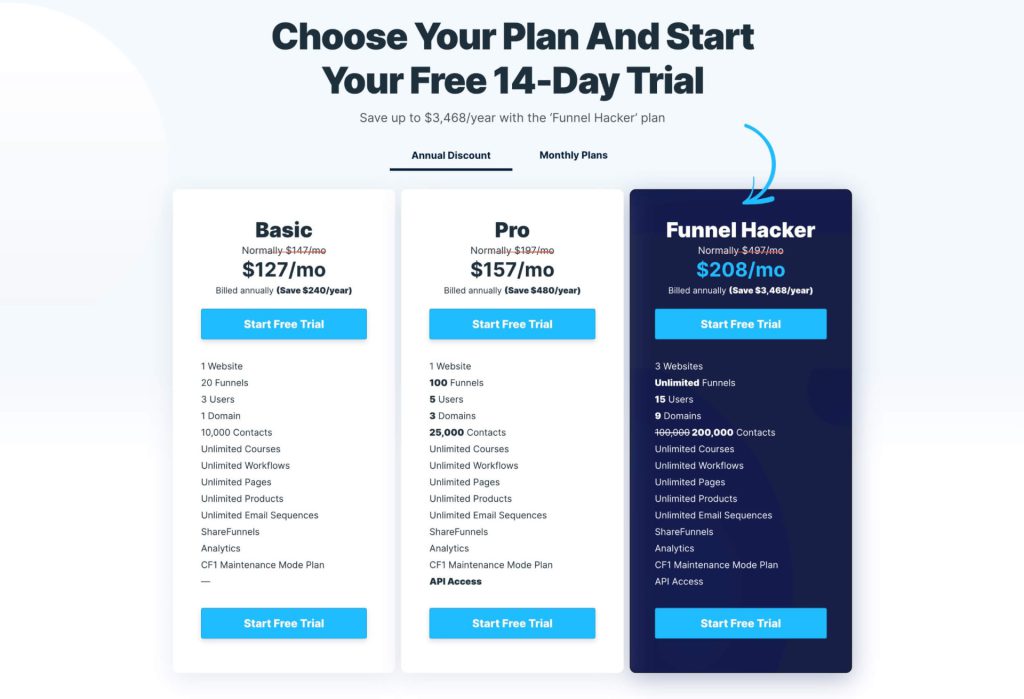
ClickFunnels offers several pricing tiers, each designed to cater to different business sizes and needs. The primary tiers include:
- Basic Plan: Positioned as the starting point for many users, the Basic plan is well-suited for smaller businesses or individual entrepreneurs initiating their online journey. This plan grants access to fundamental funnel-building tools, ensuring a solid foundation for users. However, it comes with some limitations, particularly on the number of funnels and pages that can be created.
- Pro Plan: Tailored for growing businesses, the Pro plan takes a step beyond, offering advanced features essential for businesses aiming to expand their online presence. With this plan, users enjoy the luxury of unlimited funnels, pages, and visitors. Additionally, it provides access to extra tools such as email autoresponders and affiliate program management. The Pro plan becomes an ideal choice for businesses ready to scale their marketing efforts and reach a broader audience.
- Elite Plan: At the pinnacle of service offerings is the Elite plan, catering to large-scale enterprises or highly successful entrepreneurs. This premium tier encompasses all the features from the lower plans, ensuring a comprehensive suite of tools for maximum functionality. Exclusive benefits of the Elite plan include priority support and access to advanced training materials, making it an excellent choice for those seeking extensive functionality and personalized assistance.
The cost of ClickFunnels plans reflects the platform’s focus on advanced marketing tools and sales funnel optimization. Businesses should consider not only the monthly subscription cost but also the potential return on investment (ROI) that effective sales funnels can bring.
Shopify Pricing
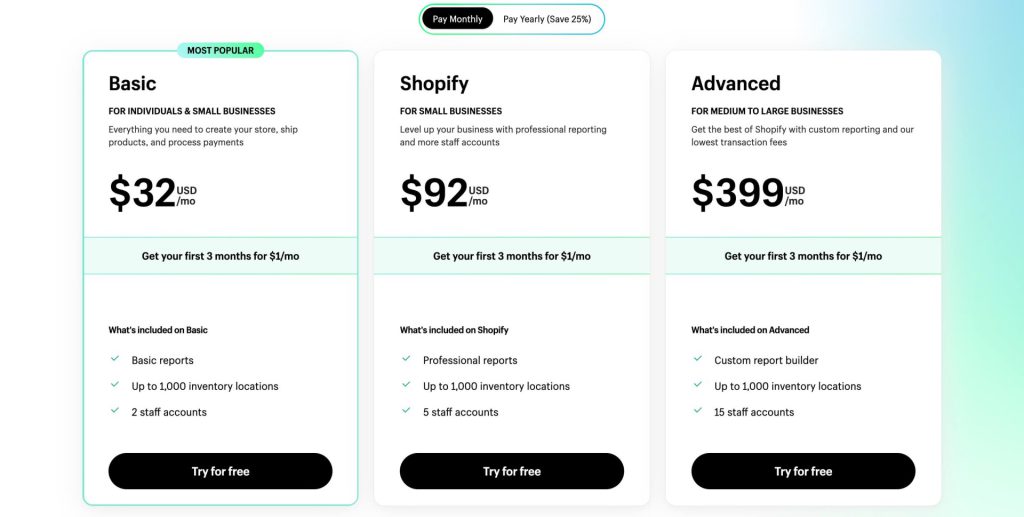
Shopify’s pricing structure is tiered to accommodate businesses at various stages of growth:
- Basic Shopify Plan: Perfect for new online stores, this plan offers all the necessary tools to start a business, including website and blog creation, and access to an unlimited number of products. It’s a great starting point for small-scale businesses.
- Shopify Plan: This middle-tier plan is designed for growing businesses. It includes everything in the Basic plan, plus additional features like professional reports and better rates for shipping and payment processing.
- Advanced Shopify Plan: Targeting large businesses and high-volume sellers, this plan offers the best features for scaling, such as advanced report building and third-party calculated shipping rates.
Each Shopify plan also includes access to its extensive app store, where additional functionalities can be added, often at extra cost.
Unlike ClickFunnels, Shopify’s pricing is more focused on comprehensive e-commerce solutions rather than solely on marketing and sales funnel creation.
ClickFunnels Cons:
- Limited E-Commerce Muscle:
- If you’re looking for an all-out e-commerce platform, ClickFunnels might leave you wanting more. It’s built for sales funnels, which means the full suite of e-commerce features might be a bit on the slim side.
- Monthly Subscription Sting:
- Brace yourself for the monthly hit on your wallet. ClickFunnels doesn’t come cheap, especially if you’re just starting out or running a smaller operation. It’s a commitment, no doubt.
- Learning Curve Hurdles:
- Be prepared to roll up your sleeves. ClickFunnels can be a bit like learning to ride a bike – challenging at first. If you’re not familiar with the online marketing terrain, there might be a few bumps in the learning process.
- Design Shackles:
- While ClickFunnels provides templates to speed up the process, don’t expect a limitless playground for design. Customization options can be somewhat constrained, especially if you’re a code wizard wanting more freedom.
- SEO on Training Wheels:
- Your SEO game might not be as strong here. ClickFunnels might not be the poster child for SEO-friendliness, potentially leaving your website a tad less visible in the vast online sea.
- Hosting Handcuffs:
- Hosting freedom? Not so much. ClickFunnels holds the keys to your hosting kingdom, meaning you’ll have less say over server matters or quirky configurations.
Shopify Cons:
- Transaction Toll Booth:
- Get ready to pay the toll. Shopify isn’t shy about transaction fees, especially if you’re not using their payment system. Those fees can add up, taking a nibble out of your hard-earned profits.
- Monthly Subscription Squeeze:
- It’s a subscription world, and Shopify is living in it. The monthly costs can pile up, especially if your store is bursting with products or you’re pulling in the traffic.
- Customization Cliff for Newbies:
- If coding isn’t your jam, customizing your Shopify store might feel like climbing a mountain without a map. The terrain is called Liquid, and it can be a bit tricky without some coding prowess.
- App Alarms:
- Apps are great – until you see the bill. While the Shopify App Store offers a treasure trove of functionality, some gems come with a price tag. Keep an eye on those app costs; they can sneak up on you.
- App Overload Anxiety:
- Brace yourself for an app-dependent reality. Some features might need third-party apps to shine, introducing a reliance on external developers and the occasional compatibility hiccup.
- SEO URL Gymnastics:
- SEO aficionados might find the URL structure a bit inflexible. Shopify’s structure might not do all the acrobatics you want for optimal search engine performance.
Remember, your choice depends on your unique needs and aspirations. Dive into the details, assess your business goals, and consider these pros and cons as your trusty guides on the e-commerce frontier!
ClickFunnels vs Shopify: Which One is Better?
The choice between ClickFunnels vs Shopify hinges on your specific business model, the nature of your products or services, and your primary sales and marketing strategies.
Both platforms excel in their respective domains but cater to different aspects of the online business landscape.
Choose Shopify If
- You’re Building an Online Store: If your primary goal is to create and manage a full-fledged online store with a wide range of products, Shopify is the superior choice. It offers comprehensive tools for inventory management, a variety of payment gateways, and extensive customization options for your store’s design.
- You Need an All-in-One E-commerce Solution: Shopify is an end-to-end e-commerce platform. It’s ideal for entrepreneurs who need a robust system that covers every aspect of online retail, from product listing to shipping and customer management.
- Scalability is a Key Consideration: If you anticipate rapid growth or have plans to significantly scale your business, Shopify’s infrastructure is designed to support expansion, handling increased traffic and sales without a hitch.
- SEO and Organic Traffic Are Important: For businesses relying heavily on SEO and organic search traffic, Shopify’s SEO-friendly structure offers a significant advantage.
Choose ClickFunnels If
- Your Focus is on Marketing and Sales Funnels: ClickFunnels is the go-to platform for creating high-converting sales funnels. It’s ideal for businesses that rely on lead generation, webinars, product launches, or any strategy that requires guiding customers through a structured sales journey.
- You Offer a Limited Number of Products or Services: If your business model revolves around a few key products or services, ClickFunnels can help you create targeted, conversion-optimized funnels for each offering.
- You’re Looking for High Conversion Rates: With its array of funnel templates and A/B testing features, ClickFunnels is built to maximize conversion rates, making it a powerful tool for businesses focused on direct sales and marketing ROI.
- Integration with Other Marketing Tools is Crucial: If you rely heavily on email marketing, webinars, or affiliate programs, ClickFunnels offers seamless integrations with these tools, enhancing your overall marketing strategy.
Exploring Alternative Tools for Diverse Business Needs
While ClickFunnels and Shopify are prominent players in the online business arena, it’s important to consider other tools that might align more closely with specific business requirements or offer different features. Here’s a look at some alternative platforms and their unique offerings:
For Building Comprehensive Online Stores
- BigCommerce: Ideal for businesses looking for an alternative to Shopify, BigCommerce offers a similar range of features for building and managing online stores. It stands out with its native features for B2B businesses and extensive customization capabilities without requiring extensive coding.
- WooCommerce: A powerful, open-source e-commerce solution designed for WordPress websites. It’s a great choice for businesses that want complete control over their online store’s design and functionality, especially those already invested in the WordPress ecosystem.
For Sales Funnel Creation and Marketing Automation
- Leadpages: A strong alternative to ClickFunnels for businesses focusing on building landing pages and simple sales funnels. Leadpages is known for its user-friendly interface and affordable pricing, making it a good choice for small businesses and solopreneurs.
- Kartra: Another all-in-one marketing platform like ClickFunnels, Kartra offers tools for creating funnels, hosting videos, launching email campaigns, and more. It’s particularly useful for businesses looking for an integrated marketing solution beyond just funnel building.
For CRM and Customer Management
- HubSpot: A comprehensive CRM platform that offers a wide range of sales, marketing, and customer service tools. It’s an excellent choice for businesses seeking an integrated approach to managing customer relationships across different stages of the sales funnel.
- Salesforce: Ideal for larger businesses or those with complex sales processes, Salesforce provides a robust CRM solution with extensive customization and integration capabilities.
For Payment Processing and E-commerce Integrations
- Square: A popular choice for businesses seeking an integrated point-of-sale and payment processing system. Square is particularly useful for businesses with both online and physical storefronts.
- Stripe: A powerful payment processing tool that integrates seamlessly with many e-commerce platforms. Stripe is known for its developer-friendly API and is suitable for businesses looking for flexible payment solutions.
ClickFunnels vs Shopify: Our final thoughts.
To sum it up: If you’re a marketing pro ready to dive into full-time online store management, Shopify’s got your back. Its top-notch product features are unbeatable.
Just be ready to navigate the world of integrations for your landing pages and marketing efforts.
Now, if you’re just starting and want a hassle-free journey into selling products, ClickFunnels is your friend.
No need for a marketing degree – it’s an all-in-one package, even throwing in hosting to get you started.
And if you’re leaning towards Shopify, consider kicking things off with a landing page editor like Shogun. It can make your life easier from day one.
Frequently Asked Questions (FAQs)
Q1: What is the main difference between ClickFunnels vs Shopify?
- A1: ClickFunnels is primarily focused on building sales funnels for marketing and lead conversion, whereas Shopify is an all-in-one e-commerce platform designed for creating and managing online stores, handling everything from inventory to payment processing.
Q2: Which platform is better for creating an online store?
- A2: Shopify is the better choice for creating a comprehensive online store due to its extensive e-commerce features, customizable storefronts, and robust inventory management system.
Q3: Is ClickFunnels suitable for beginners?
- A3: Yes, ClickFunnels is suitable for beginners, especially those focused on marketing and sales funnels, thanks to its user-friendly interface and a wide range of pre-built funnel templates.
Q4: Can I integrate other marketing tools with these platforms?
- A4: Both platforms offer integration capabilities. ClickFunnels integrates well with various marketing tools, email services, and webinar platforms, while Shopify provides seamless integration with a vast array of e-commerce and marketing apps.
Q5: Clickfunnels vs Shopify, which is cheaper?
- A5: ClickFunnels offers several pricing tiers starting at $97/month, focusing on marketing and funnel-building features. Shopify’s plans, starting at $29/month, are geared towards comprehensive e-commerce solutions with varying levels of functionality for different business sizes.
Q6: Which platform is best for SEO and organic traffic?
- A6: Shopify is generally better for SEO and organic traffic due to its SEO-friendly features and structure, making it a suitable choice for businesses relying on organic search traffic.
Q7: Are there any good alternatives to ClickFunnels and Shopify?
- A7: Yes, for online stores, BigCommerce and WooCommerce are excellent alternatives. For sales funnels and marketing automation, consider Leadpages or Kartra. HubSpot and Salesforce are great for CRM and customer management, while Square and Stripe are solid choices for payment processing.

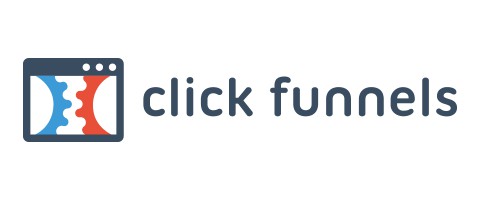
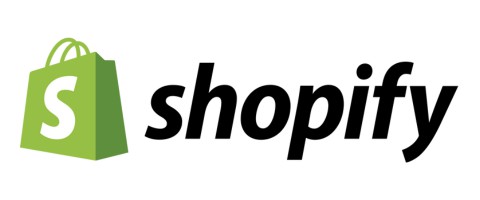
4 comments
We just wanted to take a moment to acknowledge all the hard work and effort you’ve been putting in lately. Keep up the amazing job, you’re doing great!
Good post! We will be linking to this particularly great post on our site. Keep up the great writing
I am sure this post has touched all the internet viewers, its really really pleasant post on building up new
blog.
This post is in fact a nice one it helps new web people,
who are wishing for blogging.